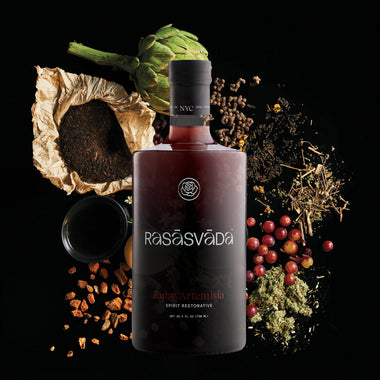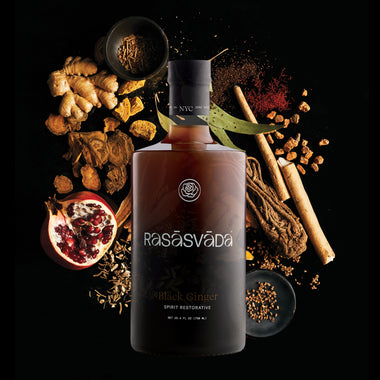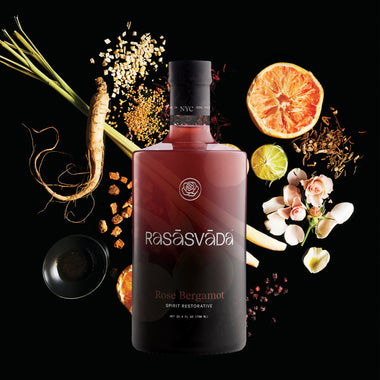Red ginseng, a type of medicinal herb cultivated in Korea and Northern China, may as well be considered a super herb.
It's been highly revered for thousands of years in traditional Chinese medicine for its extensive healing properties and ability to treat ailments such as inflammation, weakness, and sexual dysfunction.
Today, research is corroborating these uses and even adding to the list.
Because of its unique healing properties, ginseng is a key functional ingredient in Rasāsvāda's Rose Bergamot functional spirit. A zero-proof beverage that leans on both ancient wisdom and modern science.
Read on to learn about the rich history of ginseng as well as eight key health benefits and the science behind them.
Botanical Overview
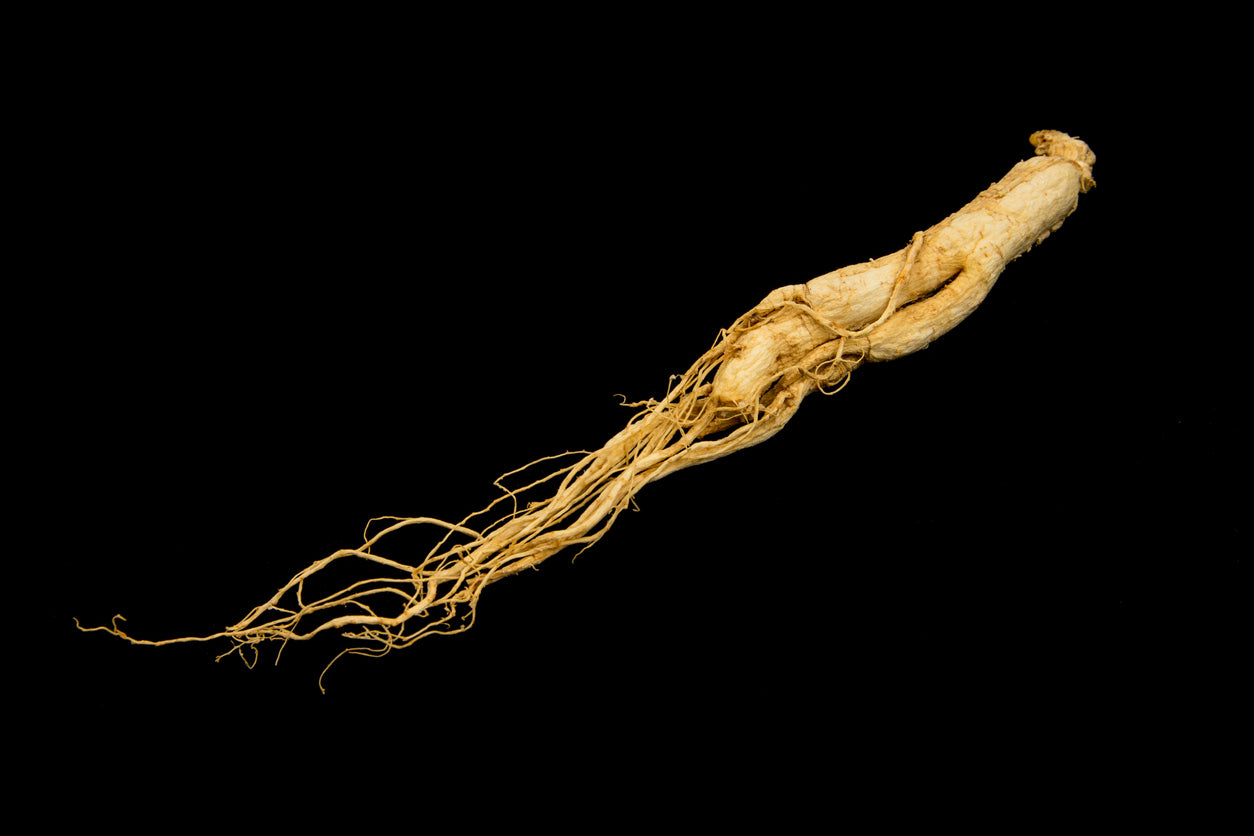
Botanical Name: Panax ginseng
Family: Araliaceae
Common Names: Asian ginseng, Chinese ginseng, Korean ginseng, Red ginseng
Location/Cultivation: Korea, China, Japan, America, and Russia
What is Ginseng?
Ginseng is a type of plant with wide green leaves and red berries. While the leaves and berries are both edible and have medicinal properties of their own, the root of the ginseng plant is most traditionally used in herbal medicine.
The root is also how ginseng got its nickname “man-root” or “human-root.” A nickname that comes from the Chinese name term Hokkien jîn-sim, later pronounced ‘renschen’ (human foot), referring to the forked shape of the root, which looks like human feet.
While ginseng is a staple in Traditional Chinese Medicine and has a special history in Northern China and Korea, it's grown in over 35 countries, making it one of the most widespread herbs in the world. Of course, because it is so widespread, there are many different species, not all with the same medicinal qualities.
Despite the variety, ‘Ginseng’ usually refers to Panax ginseng or ‘red ginseng’ a species grown in Korea and Northern China and prized for its medicinal value.
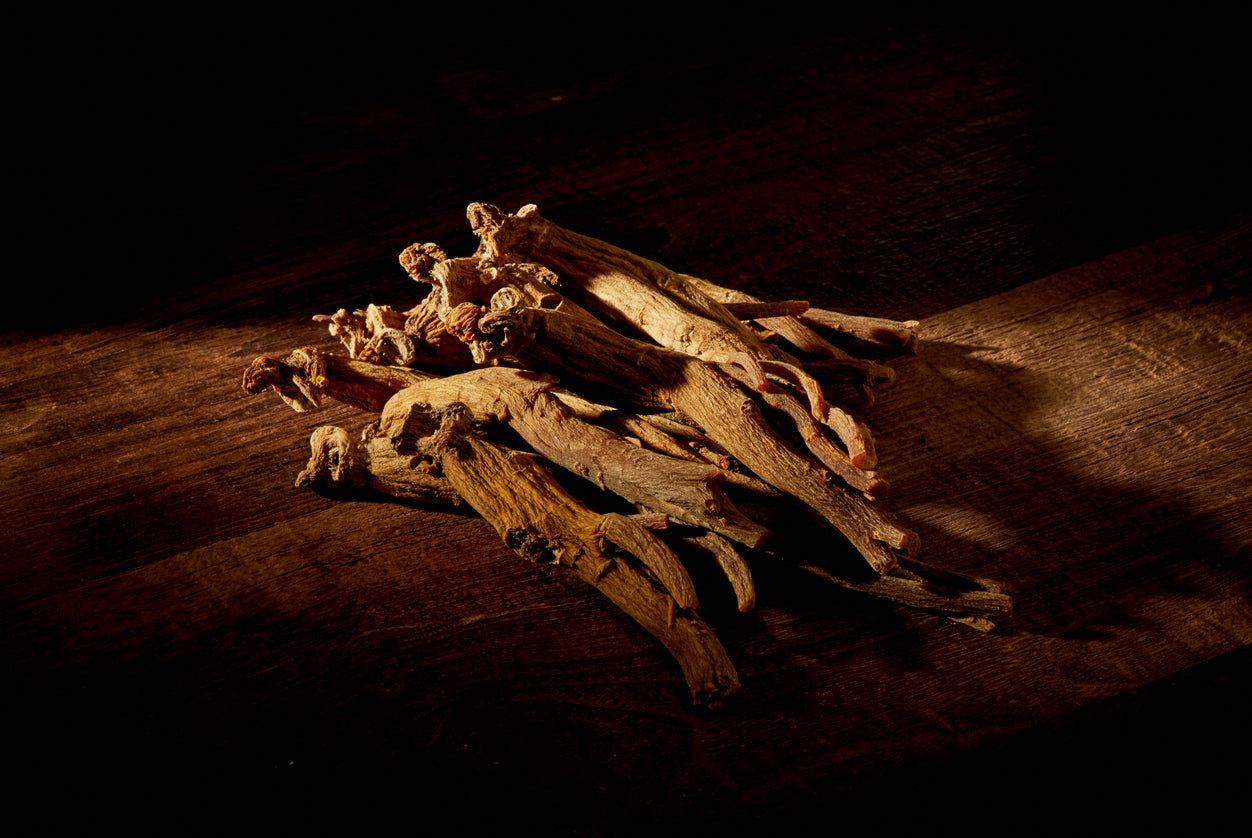
White vs Red Ginseng
Red and white ginseng are made from the same species of plant, panax ginseng, but they differ in how they are prepared.
White ginseng is simply the dried, unpeeled, root of the ginseng plant.
Red ginseng is steamed (without peeling the root), and then dried.
Steaming the root may seem like a trivial step but this process affects the amount of ginsenosides, the main beneficial compounds in ginseng, in the finished product.
History of Ginseng
Red ginseng, or Panax ginseng, is cultivated in Northern China and Korea, and has a deep-rooted medicinal history in both countries.
In Korea, the earliest accounts of ginseng date all the way back to 1123 AD, when texts described the careful steps of the steaming process to make red ginseng.
In this same text, ginseng was classified as high quality medicine and said to strengthen the body's five digestive organs, bring peace to the mind, and remove bad energies.
In traditional Chinese medicine, ginseng is used, and has been used for over 2,000 years, as a remedy for sexual health, physical weakness, heart conditions, inflammation and much more.
Ginseng, in traditional Chinese medicine, is considered to have warming medicinal qualities. In TCM, medicinal herbs have either cooling or warming properties, which can be used to help harmonize the body as illness is believed to stem from an imbalance of yin (cold) or yang (warm) energy. Ginseng would be used for those who are experiencing yang weakness, which can be balanced with a cooling herb.
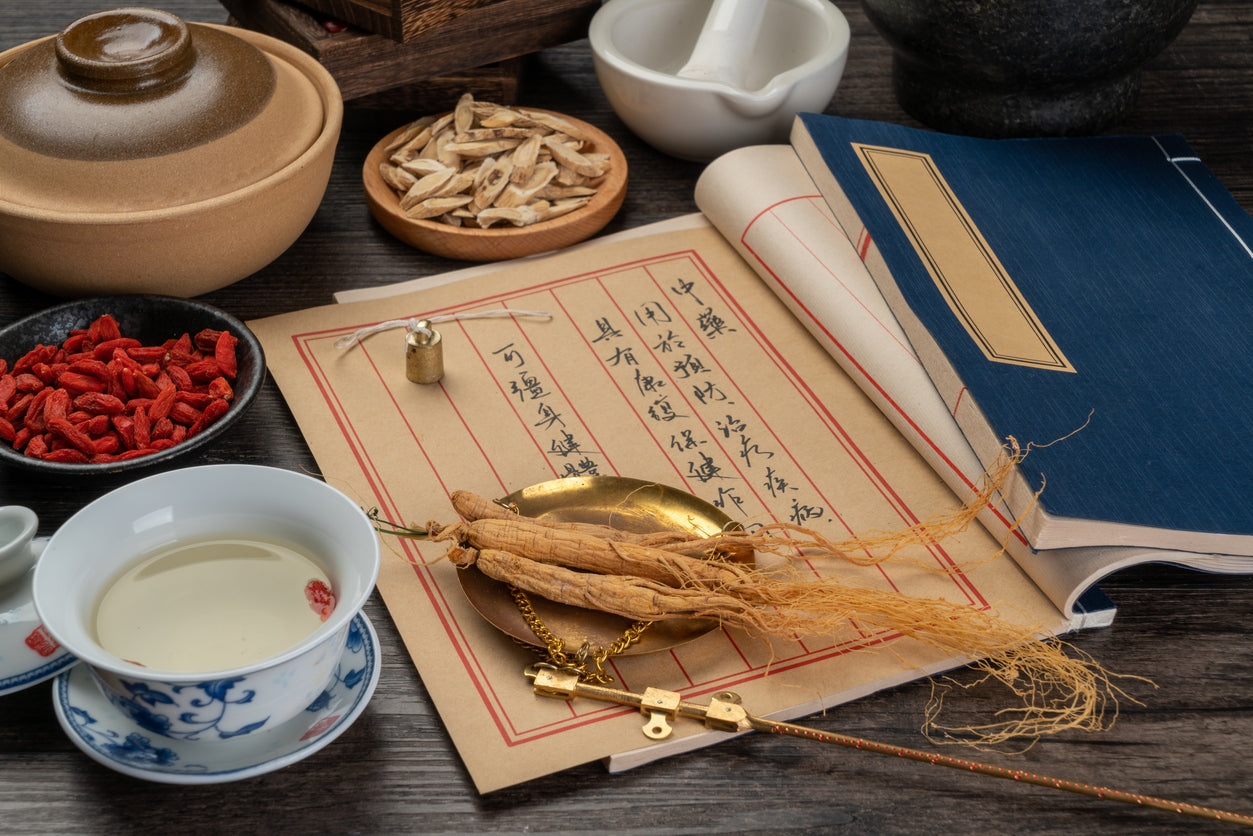
Health Benefits of Ginseng
In traditional Chinese medicine, ginseng was often referred to as a super-herb because of its ability to treat a wide variety of ailments. Conventional medicine is also catching on to the vast healing qualities of ginseng. Here we’ll discuss the health benefits of ginseng and the research behind them.
1. Longevity and Aging
Longevity doesn’t just imply living longer but living healthier too. Ginseng may help us do just that.
Ginseng acts on several of the key processes that contribute to aging and thus may hold the potential keys to help slow it down or at least mitigate some of the effects.
Ginseng gets some of its anti-aging properties from a group of compounds called gensenosides. Gensenosides help balance inflammation associated with aging, manage oxidative stress, and even play a role in apoptosis (a process our bodies do to help prevent diseases), according to some studies.
The antioxidants in ginseng likely also contribute to its longevity-promoting effects. Antioxidants are compounds found naturally in our bodies and from plant sources that play a key role in maintaining the health of cells and preventing disease.
While there are a handful of studies showing ginseng's promise as a longevity aid, researchers still aren’t sure how often someone would need to take ginseng or how much they would need to take in order to reap the benefits. Future clinical trials may help scientists answer these important questions.
2. Men’s Sexual Health
Ginseng has been a remedy for supporting sexual health for thousands of years in TCM, possibly even dating back over 2000 years to the Han Dynasty. Recent studies have looked at ginseng's effect on sexual health (mostly in men), including common complaints like erectile dysfunction, low libido, and infertility.
To date, the majority of studies have shown promising results. Ginseng may help support sex drive, sexual response, and possibly even fertility. It’s important to note, though, that these studies are still in the early stages of research, conducted on animals or in a lab setting, and clinical trials are still needed.
Despite being in the early research stages, scientists think they know why ginseng may be helpful for sexual health. It can stimulate nitric oxide production, a compound that helps blood vessels relax, promoting blood flow. Ginseng may also act on certain hormone receptors (structures on cells that hormones connect to) that impact sperm production and testosterone, which are key for fertility and sexual function.
3. Cognitive Function
Most people have experienced occasional brain fog or trouble focusing, and often these symptoms can worsen with age. Researchers think that ginseng may play a protective role when it comes to cognitive health, particularly in aging populations.
Ginseng contains a group of compounds called ginsenodies, which support the brain in a few different ways.
Ginsenosides help keep brain cells healthy by managing inflammation, oxidative stress, and even apoptosis (a process that is vital for disease prevention). Though research is still early, this could be key for people with neurodegenerative diseases, as ginsenosides may help preserve some neuron functioning or slow the die off of neurons.
Ginseng may be beneficial for healthy brains, too. Several studies found that ginseng helped improve cognitive functioning. Participants were given a mini-mental state examination (a standard test used to evaluate cognitive function), and showed improvement after supplementing with ginseng.
Still, there is no standardized dose for ginseng. More rigorous studies will help researchers determine ideal dosing and benefits.
4. Immune System Support
Our immune systems are complex-- involving several types of cells and pathways that need to be balanced in order for us to stay healthy and defend against bacteria and viruses.
The immune system can be broken into two different parts: the innate and the adaptive immune system.
The adaptive immune system refers to your immune system's “memory.” If a virus or pathogen is introduced, it develops a defense against that specific pathogen and can respond quicker if reexposed. The adaptive immune system is highly targeted.
The innate immune system is not targeted or specific to a certain pathogen and will respond to any threat.
Ginseng helps support both the innate and adaptive immune system.
First, it can help promote a targeted immune response. Meaning, it helps the body produce antibodies, which are specific to a virus or pathogen. This is especially valuable when the body is defending against a pathogen it has encountered before, as it can fight the virus faster and more effectively.
Ginseng can also help enhance the production of cells called NK cells, a type of white blood cell that kills diseased cells and is part of the body’s innate immune response.
Because ginseng has these properties, scientists suspect it may be a valuable aid for supporting the immune system and potentially even acting as a treatment against certain viruses.
5. Energy Support
If you’re looking for something to replace the caffeine in your cup of coffee, ginseng is a promising candidate.
While it may not give you the same perky energy as caffeine, one study found ginseng may alleviate fatigue by acting on a hormone called corticosterone, which plays a role in energy regulation. The same study found that ginseng can help reduce the fatigue-inducing effects of stress in mice.
When it comes to supporting exercise, ginseng also shows promise. Ginseng improved exercise endurance in animal studies, possibly by easing exercise-induced muscle damage and oxidative stress and relieving inflammation.
Further human studies will help researchers confirm ginseng's fatigue-fighting effects.
6. Heart Health
In Traditional Chinese Medicine, ginseng is used for treating various types of heart conditions. Today, researchers are particularly interested in a specific group of compounds in ginseng called ginsenosides.
Ginsenosides are known to contain properties that play a role in mitochondrial health. Mitochondria are responsible for producing energy that the cell uses to function. Damaged mitochondria can lead to certain diseases, and the heart, since it relies heavily on energy production, is especially vulnerable. For this reason, many types of heart disease are caused by mitochondrial malfunction.
Scientists believe that ginsenosides can play a targeted role in promoting heart health and alleviating heart disease.
7. Stress Support
From tinctures to teas and wellness brews, adaptogenic herbs are becoming increasingly popular in the Western world, though their beneficial effects have been known for centuries in Eastern medicine.
Ginseng is a known adaptogen, meaning it has properties that help protect against the negative effects of stress, including reducing oxidative stress — a type of stress known to cause cell damage and impairment.
One study found that participants who supplemented with ginseng saw improvements in cognition as well as a change in stress-related hormones. These results were corroborated by another study that also saw a decrease in certain stress hormones after participants were treated with ginseng.
Researchers think that ginseng may play a role in calming the nervous system, making it one more potential tool for coping with stress.
8. Skin Health
Botanicals can be effective forms of skin care, and ginseng is no exception. Research shows that when applied topically, ginseng may help protect the skin from damage caused by the sun. This includes the development of dark spots caused by melanin formation, as well as the prevention of collagen breakdown. Ginseng may also help the skin stay moisturized.
These are just the results of a few studies, and not all participants saw results. But so far, research shows that topical ginseng may be beneficial for some.
Ginseng in Rasāsvāda
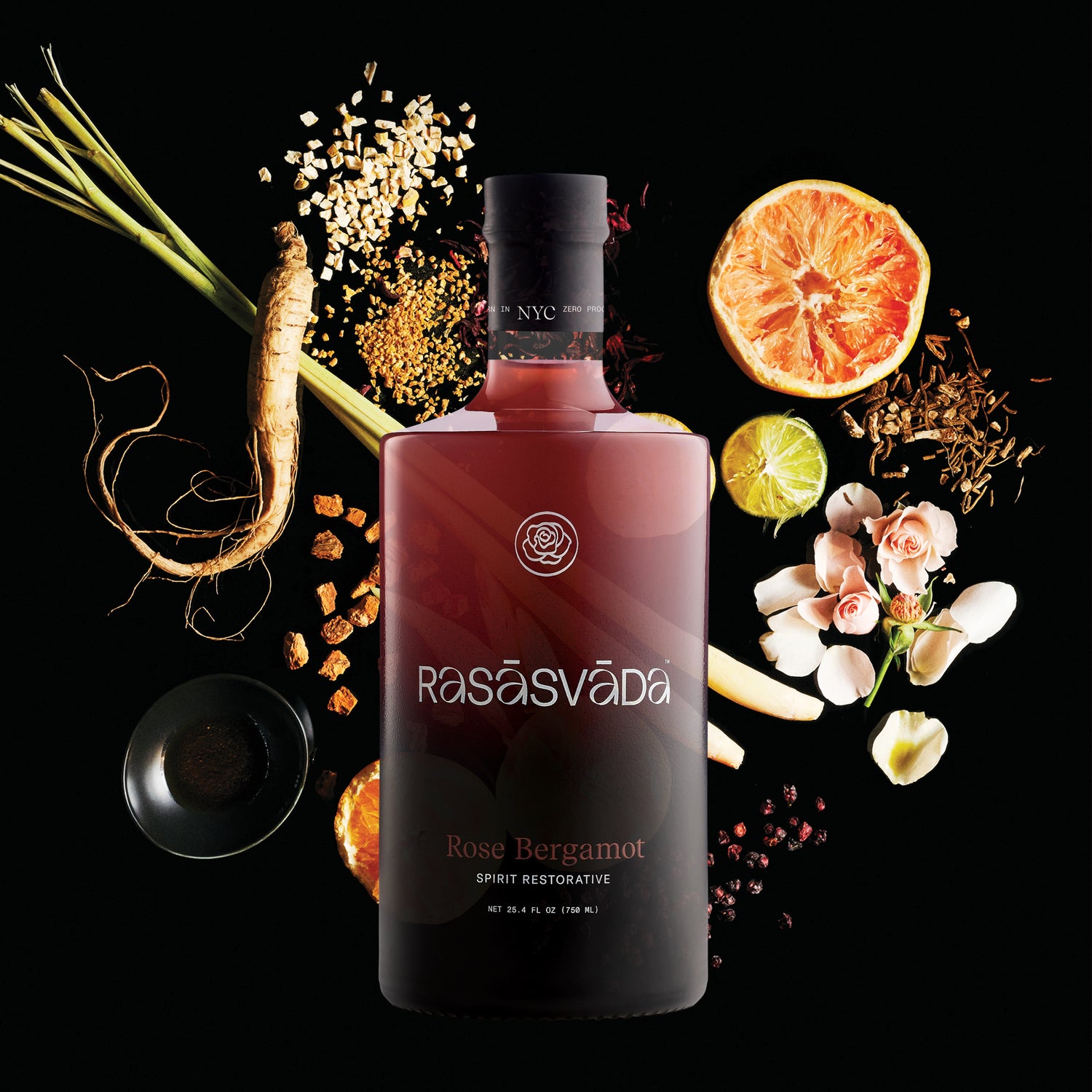
Ginseng is one of the hero ingredients in Rasāsvāda's Rose Bergamot spirit restorative, a floral, delicately bitter blend of health-supporting botanicals like schisandra berry and hibiscus. Rose Bergamot helps calm the nervous system, support mood, and restore balance. It’s made from 100% plants that are carefully sourced for purity and potency, including Ginseng, sourced directly from China.
Part Used: Root
Taste/Energy: Bitter, earthy, slightly sweet
How to drink it: Sip it neat, mix it with sparkling water, or blend it into your daily drink—whether that’s a smoothie, wellness tonic, or cocktail.
Key Takeaways
Panax ginseng is a type of medicinal herb that’s been used extensively in traditional Chinese medicine for ailments such as inflammation, weakness, and sexual dysfunction. Today, research suggests that ginseng may also support longevity and aging, men’s sexual health, cognitive functioning, energy support, heart health, stress support, and skin health.
FAQs
Sources
Journal of Ginseng Research | Ancient herbal therapy: A brief history of Panax ginseng
Iran Journal of Psychiatry | Eustress and Malondialdehyde (MDA): Role of Panax Ginseng: Randomized Placebo Controlled Study
Nutrients | Exploratory Systematic Review and Meta-Analysis of Panax Genus Plant Ingestion Evaluation in Exercise Endurance
Journal of Ginseng Research | Red ginseng (Panax ginseng Meyer) oil: A comprehensive review of extraction technologies, chemical composition, health benefits, molecular mechanisms, and safety
Foods | Recent Advances in Panax ginseng C.A. Meyer as a Herb for Anti-Fatigue: An Effects and Mechanisms Review
Frontiers in Pharmacology | Mitochondrial dysfunction in heart diseases: Potential therapeutic effects of Panax ginseng
Journal of Ginseng Research | Effect of Korean Red Ginseng in individuals exposed to high stress levels: a 6-week, double-blind, randomized, placebo-controlled trial
100% plants. 0% preservatives.


